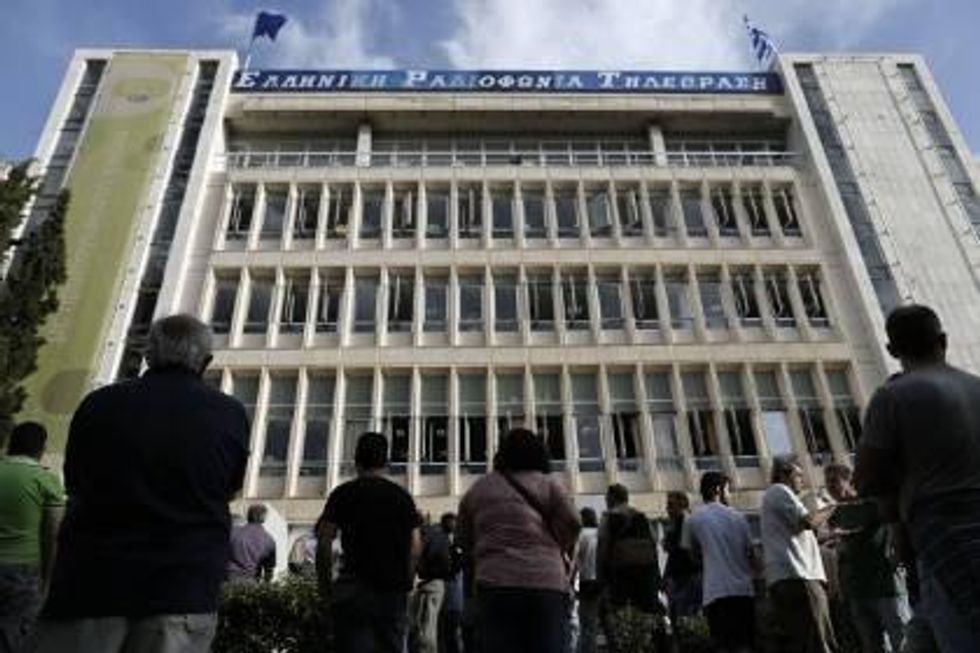Killing the Messenger in Greece
"We're on air, the last little bit of air that's left for us to breathe. We're staying here all night, and beyond that, as long as it takes..."
"We're on air, the last little bit of air that's left for us to breathe. We're staying here all night, and beyond that, as long as it takes..."

A couple of hours ago I spoke to Marilena Katsimi, an ERT journalist inside the Athens building. She said that when the rumours of ERT's impending closure first surfaced two weeks ago, nobody took them seriously: "We just couldn't believe they would do it." But all day today the director was shut up in his office, not speaking to anyone. At six o'clock, New Democracy minister Simos Kedikoglou announced that ERT was being shut down because of "a scandalous lack of transparency," waste and abuses by its bloated workforce. Katsimi found his statement deeply offensive: "He actually said 'the party's over,' when it was their party. Since this government came to power they've been buying in expensive programs, bringing in their own people, hiring thirty or forty consultants at 4,000 euros a month when our salaries have been cut by some 40 percent and we're making 1,000. How dare he tell us we've been having a party here?" Last year Katsimi was suspended from presenting a morning TV news show because she referred, somewhat sarcastically, to a threat by the public order minister to sue The Guardian for reporting allegations that the Greek police had tortured antifascist protesters.
Of course, sucessive governments, both PASOK and New Democracy, have long given jobs at ERT (and elsewhere in the public sector) as prizes to loyal supporters. Everyone has heard stories of "journalists" drawing fat salaries and never showing up in the office. But as the blog Crisis Republic points out, the new, streamlined state broadcaster promised by Kedikoglou (at some vague point in the future) will look much like the old one--except it will be staffed entirely by this government's supporters, at a cost in compensation and new salaries of several million euros.
So, in the name of transparency and cutting costs, the government has closed, by fiat and at great expense, the country's only public broadcaster--the only broadcaster (for all its flaws) that isn't pushing the agendas of the oligarchs. It has laid off some 2,700 people in one fell swoop--exceeding the Troika's demand for 2,000 more public-sector job cuts. And it has opened the way for the distribution of lucrative franchises--for sports broadcasts, for instance--to the private TV channels which feed the Greek people the relentless diet of pap, hysteria, conspiracy theories and xenophobic propaganda that has helped sink the country into its current mess. Last week, Turkish TV notoriously showed movies about penguins instead of the police repression in Taksim Square. Greek TV has been poisoning people's minds for decades; penguins would be an improvement.
The closure of ERT is the most dramatic in a series of attacks on free speech and public space by the Greek government. It comes as the official story of the austerity program's success has been undermined by the IMF's admission that serious mistakes were made, and by the Russian giant Gazprom's failure to bid for the state-owned energy company. Greek friends are asking each other, Is this the beginning of the end? I couldn't say; but in tragedies, killing the messenger is usually a sign that things aren't going well.
An Urgent Message From Our Co-Founder
Dear Common Dreams reader, The U.S. is on a fast track to authoritarianism like nothing I've ever seen. Meanwhile, corporate news outlets are utterly capitulating to Trump, twisting their coverage to avoid drawing his ire while lining up to stuff cash in his pockets. That's why I believe that Common Dreams is doing the best and most consequential reporting that we've ever done. Our small but mighty team is a progressive reporting powerhouse, covering the news every day that the corporate media never will. Our mission has always been simple: To inform. To inspire. And to ignite change for the common good. Now here's the key piece that I want all our readers to understand: None of this would be possible without your financial support. That's not just some fundraising cliche. It's the absolute and literal truth. We don't accept corporate advertising and never will. We don't have a paywall because we don't think people should be blocked from critical news based on their ability to pay. Everything we do is funded by the donations of readers like you. Will you donate now to help power the nonprofit, independent reporting of Common Dreams? Thank you for being a vital member of our community. Together, we can keep independent journalism alive when it’s needed most. - Craig Brown, Co-founder |
"We're on air, the last little bit of air that's left for us to breathe. We're staying here all night, and beyond that, as long as it takes..."

A couple of hours ago I spoke to Marilena Katsimi, an ERT journalist inside the Athens building. She said that when the rumours of ERT's impending closure first surfaced two weeks ago, nobody took them seriously: "We just couldn't believe they would do it." But all day today the director was shut up in his office, not speaking to anyone. At six o'clock, New Democracy minister Simos Kedikoglou announced that ERT was being shut down because of "a scandalous lack of transparency," waste and abuses by its bloated workforce. Katsimi found his statement deeply offensive: "He actually said 'the party's over,' when it was their party. Since this government came to power they've been buying in expensive programs, bringing in their own people, hiring thirty or forty consultants at 4,000 euros a month when our salaries have been cut by some 40 percent and we're making 1,000. How dare he tell us we've been having a party here?" Last year Katsimi was suspended from presenting a morning TV news show because she referred, somewhat sarcastically, to a threat by the public order minister to sue The Guardian for reporting allegations that the Greek police had tortured antifascist protesters.
Of course, sucessive governments, both PASOK and New Democracy, have long given jobs at ERT (and elsewhere in the public sector) as prizes to loyal supporters. Everyone has heard stories of "journalists" drawing fat salaries and never showing up in the office. But as the blog Crisis Republic points out, the new, streamlined state broadcaster promised by Kedikoglou (at some vague point in the future) will look much like the old one--except it will be staffed entirely by this government's supporters, at a cost in compensation and new salaries of several million euros.
So, in the name of transparency and cutting costs, the government has closed, by fiat and at great expense, the country's only public broadcaster--the only broadcaster (for all its flaws) that isn't pushing the agendas of the oligarchs. It has laid off some 2,700 people in one fell swoop--exceeding the Troika's demand for 2,000 more public-sector job cuts. And it has opened the way for the distribution of lucrative franchises--for sports broadcasts, for instance--to the private TV channels which feed the Greek people the relentless diet of pap, hysteria, conspiracy theories and xenophobic propaganda that has helped sink the country into its current mess. Last week, Turkish TV notoriously showed movies about penguins instead of the police repression in Taksim Square. Greek TV has been poisoning people's minds for decades; penguins would be an improvement.
The closure of ERT is the most dramatic in a series of attacks on free speech and public space by the Greek government. It comes as the official story of the austerity program's success has been undermined by the IMF's admission that serious mistakes were made, and by the Russian giant Gazprom's failure to bid for the state-owned energy company. Greek friends are asking each other, Is this the beginning of the end? I couldn't say; but in tragedies, killing the messenger is usually a sign that things aren't going well.
"We're on air, the last little bit of air that's left for us to breathe. We're staying here all night, and beyond that, as long as it takes..."

A couple of hours ago I spoke to Marilena Katsimi, an ERT journalist inside the Athens building. She said that when the rumours of ERT's impending closure first surfaced two weeks ago, nobody took them seriously: "We just couldn't believe they would do it." But all day today the director was shut up in his office, not speaking to anyone. At six o'clock, New Democracy minister Simos Kedikoglou announced that ERT was being shut down because of "a scandalous lack of transparency," waste and abuses by its bloated workforce. Katsimi found his statement deeply offensive: "He actually said 'the party's over,' when it was their party. Since this government came to power they've been buying in expensive programs, bringing in their own people, hiring thirty or forty consultants at 4,000 euros a month when our salaries have been cut by some 40 percent and we're making 1,000. How dare he tell us we've been having a party here?" Last year Katsimi was suspended from presenting a morning TV news show because she referred, somewhat sarcastically, to a threat by the public order minister to sue The Guardian for reporting allegations that the Greek police had tortured antifascist protesters.
Of course, sucessive governments, both PASOK and New Democracy, have long given jobs at ERT (and elsewhere in the public sector) as prizes to loyal supporters. Everyone has heard stories of "journalists" drawing fat salaries and never showing up in the office. But as the blog Crisis Republic points out, the new, streamlined state broadcaster promised by Kedikoglou (at some vague point in the future) will look much like the old one--except it will be staffed entirely by this government's supporters, at a cost in compensation and new salaries of several million euros.
So, in the name of transparency and cutting costs, the government has closed, by fiat and at great expense, the country's only public broadcaster--the only broadcaster (for all its flaws) that isn't pushing the agendas of the oligarchs. It has laid off some 2,700 people in one fell swoop--exceeding the Troika's demand for 2,000 more public-sector job cuts. And it has opened the way for the distribution of lucrative franchises--for sports broadcasts, for instance--to the private TV channels which feed the Greek people the relentless diet of pap, hysteria, conspiracy theories and xenophobic propaganda that has helped sink the country into its current mess. Last week, Turkish TV notoriously showed movies about penguins instead of the police repression in Taksim Square. Greek TV has been poisoning people's minds for decades; penguins would be an improvement.
The closure of ERT is the most dramatic in a series of attacks on free speech and public space by the Greek government. It comes as the official story of the austerity program's success has been undermined by the IMF's admission that serious mistakes were made, and by the Russian giant Gazprom's failure to bid for the state-owned energy company. Greek friends are asking each other, Is this the beginning of the end? I couldn't say; but in tragedies, killing the messenger is usually a sign that things aren't going well.

